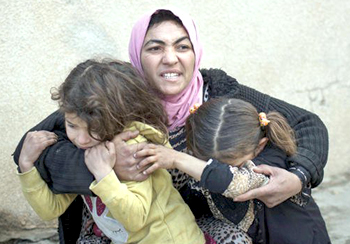Riyadh, Jul 14: With the end of the battle for Mosul in Iraq, the UN children’s agency UNICEF has made an urgent appeal for assistance and protection of 650,000 children affected by the conflict during the last three years.

Hamida Ramadhani, UNICEF’s deputy representative in Iraq, said in a statement addressed to Arab News that although the battle for Mosul is coming to an end, children’s deep physical and mental scars would take time to heal.
“Some 650,000 boys and girls, who have lived through the nightmare of violence in Mosul, have paid a terrible price and endured many horrors over the past three years,” she said.
“Some children continue to suffer in the pockets of violence that persist in the old part of west Mosul. One doctor we spoke to told us that children and mothers were emerging wounded and covered in dust and soil; some were malnourished, which is the price children are paying for living under heavy fighting for nearly 10 months,” she added.
In the past three days, UNICEF and its partners have seen an increase in the number of extremely vulnerable unaccompanied children arriving at medical facilities and reception areas. Some babies brought in have been found alone in the debris.
Unaccompanied infants and children who arrive at trauma centers and assembly points are immediately referred to UNICEF and other humanitarian organizations so they can be assisted and where possible, reunited with their families, said Ramadhani.
UNICEF, working with partners, has managed to reunite 1,333 unaccompanied or separated children from Mosul with their families. It is also distributing emergency nutritional supplements, vaccinations against diseases and emergency kits.
It is delivering water to half a million people a day. Mosul’s population prior to the conflict was estimated at 1.2 million, with the majority living in west Mosul; UNICEF estimates half are children.
As they return to their homes, children, some of whom have not been in a classroom for three years, will need to restart formal education. To date, UNICEF has supported the reopening of 470 schools in east and west Mosul, benefiting 364,500 children.
Civilian activity has quickly returned to much of Mosul and work is underway to repair damaged homes and infrastructure, something the UN estimates will initially cost more than $1 billion and take more than a year in western neighborhoods where the fighting was most intense.
Newly trained local police are deployed in Mosul alongside the military, but insecurity remains a part of daily life — a series of car bombs have already gone off close to civilians in areas previously declared “liberated.”
The security forces rely on a list of names and witness testimonies to identify suspected Daesh members, every day picking up men who managed to blend in with fleeing civilians in the fog of war and formed sleeper cells.
Human Rights Watch (HRW) has accused Iraqi security forces of forcibly relocating at least 170 families of alleged Daesh members to a closed “rehabilitation camp” as a form of collective punishment.
“Iraqi authorities shouldn’t punish entire families because of their relatives’ actions,” said Lama Fakih, deputy Middle East director at HRW.
“These abusive acts are war crimes and are sabotaging efforts to promote reconciliation in areas retaken from ISIS (Daesh).”








Comments
Add new comment